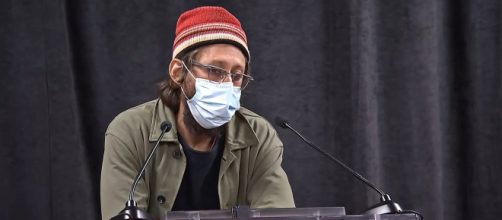U.S. journalist Danny Fenster arrived at his family home in the Detroit suburb of Huntington Woods on November 16.
Myanmar's military authorities had allowed Fenster, 37, to leave the country the previous day. Just three days before his release, the Michigan native had been sentenced to 11 years in prison for breaking immigration laws, associating with opponents of the government and spreading information considered possibly harmful to the military.
Released in chains
The BBC quoted the military government as saying Fenster had been "pardoned" and released from prison "on humanitarian grounds." Speaking at a press conference in New York, Fenster said that he had been "shackled, hands and legs" while leaving the prison.
Negotiations with Myanmar's military
Fenster's release had been the result of negotiations between Bill Richardson, former U.S. ambassador to the U.N., and the head of Myanmar's military regime, General Min Aung Hlaing. Richardson was quoted by the New York Times as expressing his gratitude that "Danny will finally be able to reconnect with his loved ones, who have been advocating for all this time, against immense odds." The journalist had been imprisoned for 176 days.
Fox 2 Detroit said Fenster had acknowledged the efforts made on his behalf by local U.S. Congressman Andy Levin. The congressman took to Twitter to comment on Fenster's "five-and-a-half excruciatingly long months of unjust detention."
Nothing compares to watching Rose Fenster envelop her son Danny in her arms after five-and-a-half excruciatingly long months of unjust detention in a Myanmar prison. pic.twitter.com/mcWcPUR0Lw
— Andy Levin (@Andy_Levin) November 16, 2021Like Richardson, Levin is a member of the Democratic Party.
More than 100 media professionals imprisoned
Since its overthrow of Aung San Suu Kyi in February, the Myanmar military had imprisoned more than 100 journalists and other media professionals, the Detroit Free Press noted. The newspaper quoted Joel Simon, of the Committee to Protect Journalists, as saying: "Myanmar is among the worst jailers of journalists in the world." The New York Times recalled that the military government had detained another American journalist, Nathan Maung, for two months.
Richardson in Myanmar as a private citizen
Richardson had gone to Myanmar as a private citizen, the AP noted. It recalled that, at first, some human rights defenders had criticized Richardson's trip for bestowing legitimacy on the isolated regime.
The U.S. Department of State had discouraged him from trying to persuade the military leader to release Fenster, the AP added.
"We are glad that Danny will soon be reunited with his family as we continue to call for the release of others who remain unjustly imprisoned in Burma," Secretary of State Antony Blinken said on November 15.
The New York Times said Fenster was still managing editor of Frontier Myanmar. The paper noted that the charges against him had been based on work he had done for another online publication, Myanmar Now, before the military takeover.


